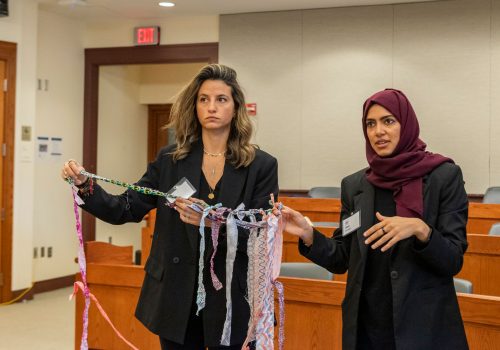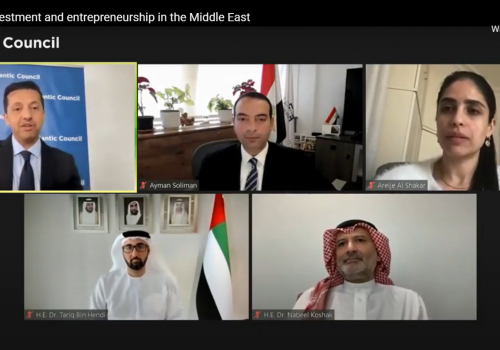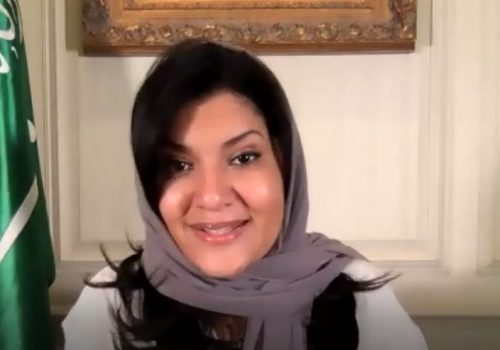Qahwa with Saudi women entrepreneurs from the WIn fellowship
On March 2, 2023, the Atlantic Council’s empowerME Initiative hosted a Twitter Space conversation with the WIn Fellows cohort. The Atlantic Council’s empowerME Initiative leads the WIn Fellowship in cooperation with Georgetown University’s McDonough School of Business, with support from the US Embassy Riyadh, UPS, and PepsiCo. The Fellowship, which aims to support Saudi women entrepreneurs in building leadership and executive capacities, offers fellows professional workshops, executive education modules, and mentoring opportunities.
Culminating this yearlong program, a US roadshow was held for the five top-performing WIn fellows:
- Meyce Alauddin, Founder and CEO, The Giveaway Co
- Dr. Rawan Al-Kharboosh, Founder and CEO, AtPoint tx
- Renad Al-Jefri, CEO, Ad Astra
- Sumayah Alzamil, Co-Founder and CEO, Nugttah
- Sara Binladen, Chief Technology Officer, Quantum
In this conversation moderated by Amjad Ahmad, Chairman of the empowerME Initiative, the cohort discussed their experiences as businesswomen in Saudi Arabia and their time as WIn Fellows. Here’s a glimpse of how it went:
AMJAD AHMAD: We’d love to hear about your journey: When did you decide to give up a great salary and cozy life to start your own businesses?
SUMAYAH ALZAMIL: For me, starting my own business was all about wanting to make a more significant impact. Although it is hard and takes time to start your business, creating jobs and enjoying what you are doing makes the decision of moving from your corporate position to building your startup an easier one.
RENAD AL-JEFRI: It was a bit different for me. At that time, my family needed access to high-quality therapeutic services for my son, who was diagnosed with severe autism at age two, and we found the process so ineffective. I started Ad Astra to help other families and children with similar problems so that they could have access to the service they needed as fast as possible.
MEYCE ALAUDDIN: Well, I’m not into the typical nine-to-five jobs! I realized that I had more to offer. I had bigger ideas and wanted to explore new business ventures and mobilize people from different sectors—whether from retail or design—to make a more significant difference through these projects. Sometimes, you can feel limited by an ordinary nine-to-five tedious job, so wanting to offer more is what ultimately got me into entrepreneurship (despite it being very stressful).
AMJAD AHMAD: Renad, you’re in a very challenging field: healthcare. What I love about your story is that your business idea came out of supporting your family, particularly your son. Can you tell us more about the healthcare space in the Kingdom today, and how you plan to improve the process of early identification for children with special needs?
RENAD AL-JEFRI: Things are improving very fast in Saudi Arabia. However, there is still a long way to go to improve the quality of life for children with special needs, since early diagnosis is critical for some disorders, such as autism, learning disabilities, or hearing problems. Therefore, it is essential to provide families with early diagnosis—and then therapeutic services—to ensure that children with special needs can reach their developmental potential. We have had many cases where children were diagnosed with autism before coming to us. Our specialists later realized that they might, in reality, have ADHD or hearing problems instead. Therefore, all children must pass a hearing screening first to prevent misdiagnosis and save time for proper treatment.
AMJAD AHMAD: Rawan, tell us about your business: how does it extend beyond Saudi Arabia towards the entire Middle East and North Africa (MENA) region? And what do you think needs to happen to shake up the financing infrastructure for projects like yours, which is almost zero in the Arab world?
RAWAN AL-KHARBOOSH: The future of healthcare increasingly relies on stem cell research, a technology that allows for using one’s own body cells to repair itself. The MENA region is ready to go forward with stem cell engineering and biotech research. In Saudi Arabia, we have talented scientists, physicians, and innovators willing to put the Kingdom on this platform to make it a formidable contributor to the regulatory body working with stem cell therapy and healthcare. In this field, opportunities that prioritize women’s role in promoting these technologies are essential.
The US government is one of the biggest financial motivators of early-stage technologies, as it provides grants for small businesses. In exchange, startups are responsible for showing their achievements to validate their work, which allows them to re-apply for funds. That makes the enterprise accountable and able to drive the economy. Unfortunately, we do not have a funding process in Saudi Arabia—that could be due to a lack of understanding of the biotech industry, and not particularly a lack of financial potential. Thus, Saudi scientists, like myself, must go elsewhere, such as US research labs, to continue working. We must remove the reliance on international discoveries, focus on funding our Saudi researchers, and bring great minds back to the region. We should also learn about the role of biotech in the future so we can start leveraging our national talents and innovators.
AMJAD AHMAD: Sumayah, you have entered one of the region’s most fascinating and profitable sectors today: food and beverages. Many changes in the region affect this sector, including the digital transformation, the opening of restaurants, and Vision 2030, which expect dramatic increases in tourist rates. What can you tell us about what is happening?
SUMAYAH ALZAMIL: It is so exciting and challenging! At first, every coffee shop imitated others’ ideas, but after a while, uniqueness showed up as business owners started realizing that customers would pay more if the quality was high. My role is to help business owners analyze customers’ behaviors so that their businesses can be sustained and then expanded.
AMJAD AHMAD: Sara, you work in e-commerce, a very fast-growing competitive space, particularly in the Kingdom. What is happening in this field in the region?
SARA BINLADEN: One of the solutions my company has been working on is making the e-commerce and food delivery business more profitable. We used to help advertisers with targeted physical advertisements, but when we shifted to the digital world, we found a gap in the technology offered on the e-commerce side. With this growing need, we pivoted our core offering and turned our primary solution to supporting clients with the ad technology they needed to offer a better customer experience, whether that is through segmentation, personalization, or customization. With a growing population and current exciting events, Saudi Arabia is a huge, important part of the MENA region. More recently, a new mandate was enforced that requires individuals and enterprises to only work with Saudi-based companies to advertise their services and products in the Kingdom. Such initiatives helped startups like us find a chance against the giants worldwide. It also allows us to showcase what we can offer, which is different and better due to the customization.
AMJAD AHMAD: Meyce, only a few years ago, your business had a local regional market; now, the world is your market. My prediction was that we would observe more regional businesses getting global in the next ten years. How do you see that from your point of view? How do you evaluate digital opportunity in the Kingdom and beyond?
MEYCE ALAUDDIN: The Giveaway Co. started online. We used social media to showcase and sell our products. Over time, our followers grew through word of mouth. This was particularly true when the pandemic hit. We were initially known among Arabs, but when they moved to other parts of the world, our market expanded, and shipping agencies enabled us to provide our services internationally. As you mentioned, people are looking more at our region to buy what they need because prices and shipping costs have increased. Therefore, people are finding it more economical to buy locally and regionally, especially since we have created an effortless process to order.
AMJAD AHMAD: As an Arab-American myself, I can see how traditional families might react to certain things. Culture does play an impact on what women end up doing and their confidence. Where do you see the culture of the region today? Is it changing?
RAWAN AL-KHARBOOSH: In entrepreneurship, there are five determinant factors: education, skills, individual talent, social and cultural expectation experiences, and access to resources. Almost every female entrepreneur I have seen in Saudi Arabia has exceeded herself when it comes to individual experiences, skills, and knowledge. What’s so special about the Atlantic Council’s WIn Fellowship is that it is not only about education, but also a narrative changer. It has allowed people in both the US and the Middle East to get to know us and what we have done, and it also provided us with practical opportunities that we gained from the social environment.
RENAD AL-JEFRI: As a Saudi woman who grew up in all-girls Islamic schools, I was empowered from day one to strive to become the best I can. As we got older and more educated, we realized that there are some limits. However, society recently started to understand that women have so much to offer due to different aspects of their personalities, and people are appreciating this as part of their business culture.
AMJAD AHMAD: If you’re speaking with your daughter or niece who is interested in entrepreneurship, what advice would you have for her?
SUMAYAH ALZAMIL: I would tell her to go for it! Then, I will discuss the details and what is required for her work.
RAWAN AL-KHARBOOSH: For any young woman who wants to start her business, I would say to go into it with an obsession to change the world! With such a belief system, anyone can conquer anything—this is what she needs to know first. Additionally, she should accept her mistakes, as it is the only way to learn.
SARA BINLADEN: It is not an easy journey. However, not only should you “go for it” like we have, but you should also know that there is a network out there that will support you. We would love to help and develop new solutions for other people’s problems, so rest assured that you have a network that supports you when needed.
RENAD AL-JEFRI: I would ask my daughter about her reasons for wanting to become an entrepreneur because I would want to make sure that she is passionate about her goal and has a clear mission statement for her startup. As Sara mentioned, there are ups and downs in an entrepreneur’s journey. If she truly believes that she can make a difference and improve people’s lives, then she’ll have my support.
MEYCE ALAUDDIN: I’m a hardcore entrepreneur at heart and have two beautiful daughters. They have grown up with a mother who has been a business owner as far as they can remember. I would always encourage them to do what they truly believe in. I will definitely push them to pursue their dream with hard work, sleepless nights, and perseverance, and I will be there to support them in whatever they need.
AMJAD AHMAD concluded the discussion by echoing the fellows’ messages: “Go for it, dream big, get support, believe in yourself, work hard, and persevere!”
You can listen to the full discussion here to learn more about what our fellows had to say.
Nour Dabboussi is the program assistant to the Atlantic Council’s Rafik Hariri Center and Middle East Programs.
Mahnaz Vahdati is a Young Global Professional with the Atlantic Council’s Middle East Programs.
Further reading
Thu, Mar 2, 2023
Meyce Alauddin: The WIn fellowship ‘helped and empowered me’
MENASource By
'As a Saudi female entrepreneur running a business in the MENA region for over eight years, I have seen the evolution in overall participation and business processes firsthand.'
Thu, Mar 25, 2021
‘It’s not a zero-sum game’: MENA officials agree that regional integration is key to growth
MENASource By
Atlantic Council’s empowerME initiative and the King Faisal Center for Research and Islamic Studies co-hosted an event that discussed strategies for building regional cooperation to create a more attractive investment landscape and productive entrepreneurial ecosystem. These are some key takeaways.
Mon, Jun 28, 2021
Princess Reema tells Saudi women entrepreneurs to dream big
MENASource By Stefanie Hausheer Ali
On June 23, 2021 the Atlantic Council’s empowerME Initiative held a workshop featuring a keynote fireside chat with Saudi Ambassador to the United States, Her Royal Highness Princess Reema Bint Bandar Al Saud, which was moderated by US Embassy Riyadh Chargé D’Affaires Martina Strong, and a panel discussion with Endeavor Saudi Arabia Managing Director Lateefa Alwaalan, 500 Startups MENA Partner Amal Dokhan, S&P Global Chief Public & Government Affairs Officer Courtney Geduldig, and UPS Vice President for Community Relations Esther Ndichu, which was moderated by empowerME Director and Resident Senior Fellow Amjad Ahmad.
Image: WIn fellows at Georgetown University (Atlantic Council)


